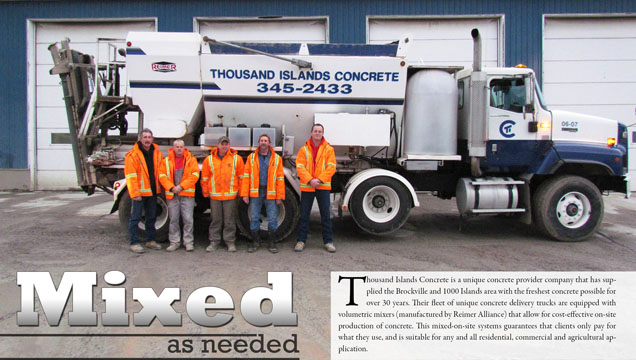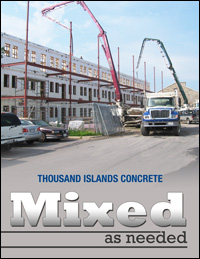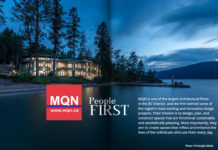Mixed as needed
Thousand Islands Concrete is a unique concrete provider company that has supplied the Brockville and 1000 Islands area with the freshest concrete possible for over 30 years. Their fleet of unique concrete delivery trucks are equipped with volumetric mixers (manufactured by Reimer Alliance) that allow for cost-effective on-site production of concrete. This mixed-on-site systems guarantees that clients only pay for what they use, and is suitable for any and all residential, commercial and agricultural application.
The company itself is a private family run business, started in 1975 by Peter Bagma in Gananoque, Ontario. Eventually, Bagma’s son Henry took over the business and moved it to Brockville. Thousand Islands Concrete passed hands one more time before it ended up with Bob Castle in 2002. Steve Castle is Bob’s son, and current Co-Owner of Thousand Islands Concrete.
Steve himself has worked in the concrete business since he was 16 years old, putting it in 15 years as a Sales Manager at LaFarge. His father Bob has been in the industry for 40 years. “Both of us have pretty much lived concrete,†Steve says.
The main thing that sets Thousand Islands Concrete apart in the marketplace is their equipment. “The volumetric trucks certainly separate themselves from the drums,†says Steve. “The advantage we have is the fact that you only pay for what you use – that’s how we market ourselves. The fact that the concrete is always fresh, that’s another avenue we use to differentiate ourselves.â€
In addition to saving their clients money, Thousand Islands’ trucks also helps distinguish the business in terms of customer service. If a contractor requires 15 yards of concrete to do a job, for example, Thousand Islands can send full two loads over and guarantee him he will have enough product to go around, and not have to wait for a balance load.
Customers of other concrete companies, on the other hand, have to order more specific amounts. If they order a meter extra or a couple yards extra to ensure they have enough, they will likely end up paying for product that they do not need. Alternatively, if they try to order exactly what they need and come up short, they will have to wait for a balance load. “That costs them time and money,†Steve says. “Poor estimating can be very expensive.â€
According to Steve, Thousand Islands Concrete even has one regular client who estimates that not having to wait for balance loads to pay for extra concrete saves him the amount of one employees wage per week. “He pays for one of his guys every week just by using us and not our competitors.â€
Finally, the company’s mixed-on-site system also provides a bonus when it comes to the realm of sustainability, which Steve is incredibly conscious of. “Sustainability is definitely one of those key words,†he says. “It’s everywhere you look. It’s something that is not to be ignored. It more or less boils down to our needs and the earth’s capacity to meet them, and being responsible about it.†At Thousand Islands Concrete, their technology lends itself perfectly to a sustainable operation. First off, they do not create waste – they only produce what a project requires. Secondly, this method also means a reduced number of truck trips, which means less carbon emissions the company is responsible for. “Sustainability and the volumetric truck go hand in hand,†says Steve. “It’s a perfect fit.â€
The right people
Another key differentiator for Thousand Islands is the wealth of experience they have present in the business. Of their six drivers, two are the sons of original founder Peter Bagma, and have been with the business over 25 years. Another driver has been with Thousand Islands for over 20 years, and the other three have careers in the company that have lasted roughly 10. “We have a very knowledgeable and experienced group of guys,†Steve understates.
“We have little to no employee turnover,†he continues. To drive a volumetric truck, you need to have a certain skill set and knowledge base, so it is in the company’s best interests to ensure their drivers stay happy and stick around. “You need expertise to operate our equipment,†Steve says. “When you get the right guy, you make sure you keep him, that’s for sure. Right in our mission statement we talk about how our goal is to provide a good product and provide a reasonable lifestyle for our guys.â€
The right plans
The biggest challenge Thousand Islands Concrete has to contend with is unfamiliarity with their equipment. When out of town contractors do work in the area, they are hesitant to use their technology simply because they never have before. “The challenge is convincing them to give us a shot,†Steve explains. In situations like that, the company is able to wear their membership in the Ready Mix Concrete Association of Ontario like a badge. To be a member of that organization, you need to meet a high certification standard, so it is a very useful avenue for convincing contractors there is validity to Thousand Islands’ system.
Moving forward, Steve says they plan to add at least two new trucks to the company fleet and expand into a different market – Sharbot Lake. “It’s cottage country,†he explains. “It’s one of those untapped markets.†The location of Sharbot Lake makes it ideal for Thousand Islands’ because the competition is far away, and the geography of the land makes it hard to get accurate measurements for required concrete – a situation where, of course, their volumetric system is valuable. “Everything’s in place now,†Steve says. “It’s just a matter of flipping the switch in the spring and we’re off to the races.â€
In general, Steve says they will continue to expand throughout Eastern Ontario. Their system does not require the construction of full scale concrete plants, so they can be versatile in their growth. “We definitely want to continue to grow, and with our type of truck it’s not a huge expense to expand our market,†Steve explains. “We need a silo and three or four acre piece of property and we’re pretty much in business.â€










